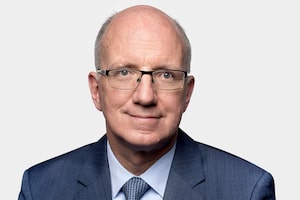Report on Business writer Andy Willis.Handout
If you only read headlines, you would be forgiven for thinking the Caisse de dépôt et placement du Québec is throwing money at every deal getting done in its home province.
Over the course of this week, Montreal-based Cogeco announced a $1.4-billion (U.S.) takeover of a U.S. cable-TV system and revealed the Caisse backstopped the acquisition with a $310-million equity injection.
That deal came Monday, the same day Montreal's landmark Fairmont The Queen Elizabeth Hotel reopened after a year-long, $110-million renovation partly paid for by the fund's real estate arm. On Thursday, owners of the Bloom Lake iron ore mine in northeastern Quebec announced plans to reopen the property, financed in part by a $100-million loan from the Caisse.
The simple takeaway from all this activity is that the Caisse is favouring one element of a dual investment mandate – promoting Quebec's economic development – over the second part of the fund's mission, which is earning the best possible returns.
That simple takeaway would be wrong.
Dig into the Caisse's numbers and you find the amount of money the fund invests in la belle province is constant over chief executive officer Michael Sabia's eight years at the helm. The $270-billion (Canadian) fund keeps capital deployed in Quebec consistent at approximately 13 per cent of assets.
You find that Caisse investments in Quebec only happen if there's a compelling investment thesis, in keeping with its approach to assets around the globe. For example, the Bloom Lake loan came with a 12-per-cent interest rate in its first year and was done in tandem with an $80-million (U.S.) credit line from fund manager Sprott Inc., which couldn't care less about the provincial flag flying over an open-pit mine.
On Mr. Sabia's watch, which is playing out with a refreshing lack of the corporate drama that plagued his predecessors, the Caisse is finding ways to serve two masters, to help a province prosper while turning in strong performance.
Ever since he took the top job at the Caisse in 2009, the fluently bilingual Mr. Sabia has used the phrase "vont de pair" in describing the fund's dual mandate; it translates as "go together" or "go hand-in-hand." It's a common-sense concept: Superior performance will inevitably result in a stronger economy.
The Caisse is delivering when it comes to returns, as the Montreal-based fund is up 10.2 per cent over the past five years, handily beating a benchmark that rose by 9.1 per cent.
The Caisse, in step with many other large funds, is achieving those numbers by shifting out of public markets, such as bonds and stocks, and into private investments. At the Caisse, that approach includes making significant, solo investments to public companies making acquisitions to extend their global reach.
The fund uses its deep ties to the Quebec business community to turn up some of these opportunities, and that's how the fund is meeting the second part of its mandate. The Caisse is a catalyst for turning regional businesses into global companies.
The Caisse's growth-focused investment strategy led to Monday's commitment to Cogeco's U.S. expansion and to money-making investments in CGI and SNC-Lavalin in recent years, as the two Quebec companies used takeovers to crack the European market.
The fixation on international growth percolates down to the Caisse's venture-capital deals. The fund is helping local companies such as D-Box Technologies debut on a world stage. The Montreal company makes the theatre seats that shake and rock in step with action on the screen; movie houses charge a premium price for the experience.
The Caisse has a seven-year relationship with D-Box and, along with pumping in cash, the fund introduced the company to theatre chains in China as part of an international expansion that's seen D-Box roll out its technology in 40 countries
However, backing expansion is a theme applied to many of the Caisse's investments, including those with some of the world's biggest companies. It is the underlying logic of a recent $2-billion commitment to Connecticut-based GE's aviation finance business and last year's decision to earmark up to $5-billion to acquire marine terminals that will be run by Dubai-based port operator DP World.
The Caisse highlights Quebec investments for practical and political reasons; the fund is entrusted with the savings of a province and wants citizens to know what it's doing with their money. The number of eggs in that one provincial basket has stayed constant on Mr. Sabia's watch.
What's changed at the Caisse in recent years is a move to major investments in companies with global ambitions. And that strategy is translating into both economic growth and strong performance for the Quebec fund.
 Andrew Willis
Andrew Willis